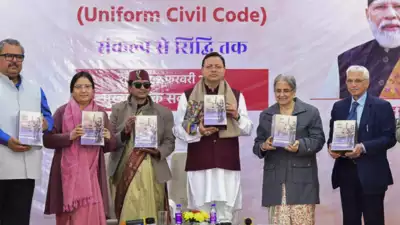In a significant move with far-reaching implications, the Uttarakhand cabinet has taken a decisive step towards the implementation of a Uniform Civil Code (UCC) by clearing the proposal. The decision, which comes amidst a backdrop of ongoing debates on secularism, gender equality, and cultural pluralism, marks a pivotal moment in India’s legal landscape. As Uttarakhand paves the way for the adoption of a UCC, the implications for personal laws, religious freedoms, and social cohesion are profound and multifaceted.
The concept of a Uniform Civil Code, enshrined in Article 44 of the Indian Constitution as a directive principle of state policy, aims to promote social justice, gender equality, and national integration by harmonizing personal laws across religious communities. However, its implementation has long been a contentious issue, with debates often centered around questions of cultural identity, religious freedom, and the autonomy of religious communities.
The decision by the Uttarakhand cabinet to clear the proposal for a Uniform Civil Code reflects a broader push towards legal uniformity and secular governance. Proponents argue that a UCC is essential for upholding the principles of equality and justice enshrined in the Constitution, irrespective of religious affiliation. By providing a common set of laws governing marriage, divorce, inheritance, and adoption, a UCC seeks to eliminate discrimination and ensure equal rights for all citizens, regardless of their religious background.
However, the move has sparked intense debate and opposition from certain quarters, particularly religious groups and conservative voices who view it as an infringement on religious autonomy and cultural identity. Critics argue that a UCC undermines the diversity and pluralism of Indian society by imposing uniformity in matters of personal law, which have traditionally been governed by religious customs and traditions. They contend that such a move could lead to a dilution of religious freedoms and a homogenization of India’s rich cultural tapestry.
Moreover, concerns have been raised about the potential impact of a UCC on marginalized communities, particularly women and minorities, who may be disproportionately affected by uniform laws that fail to accommodate their specific needs and circumstances. Critics warn that a one-size-fits-all approach to personal laws could exacerbate existing inequalities and marginalization, further entrenching systemic discrimination and social injustice.
Despite these concerns, the Uttarakhand cabinet’s decision to clear the proposal for a Uniform Civil Code reflects a growing momentum towards legal reform and modernization in India. With several other states considering similar measures, the debate surrounding the implementation of a UCC has taken on renewed significance, shaping the contours of India’s legal landscape and its commitment to secularism and social justice.
The road ahead, however, is likely to be fraught with challenges and complexities. The process of drafting and implementing a Uniform Civil Code requires careful consideration of diverse perspectives, interests, and sensitivities. It calls for meaningful dialogue and engagement with all stakeholders, including religious leaders, legal experts, civil society organizations, and marginalized communities, to ensure that the rights and freedoms of all citizens are safeguarded.
Moreover, the adoption of a UCC must be accompanied by robust mechanisms for enforcement, oversight, and accountability to prevent its misuse or misinterpretation. It requires a commitment to upholding the principles of equality, justice, and human rights enshrined in the Constitution, and a recognition of the diverse cultural, religious, and social fabric of Indian society.
As Uttarakhand takes the lead in clearing the proposal for a Uniform Civil Code, the stage is set for a broader national conversation on the future of personal laws and religious freedoms in India. The decision reflects a commitment to progressive reform and social change, but also underscores the need for careful deliberation and inclusive decision-making. In charting a path towards a more equitable and just society, the implementation of a Uniform Civil Code must be guided by principles of empathy, inclusivity, and respect for diversity, ensuring that the rights and freedoms of all citizens are protected and upheld.

